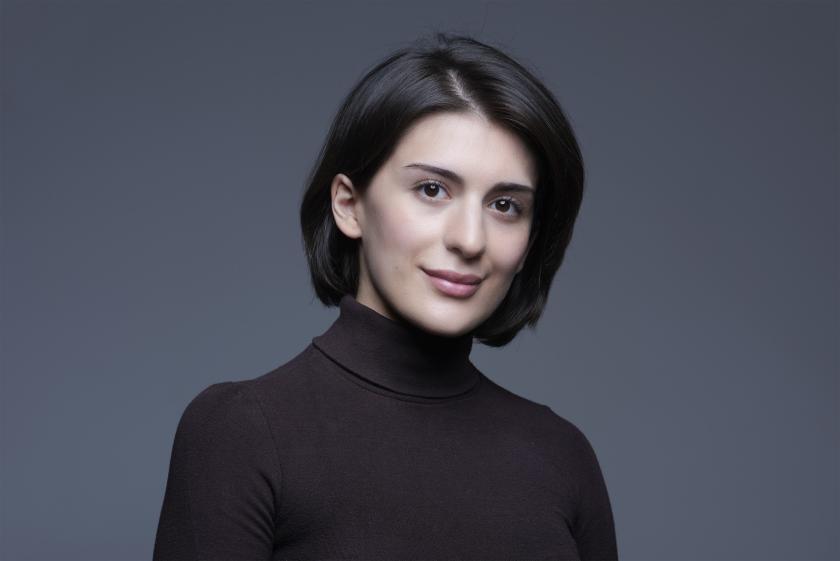For a small nation, with a population not quite comparable to Scotland’s, Georgia has for long packed a mighty musical punch. Any visitor will know the soul-wrenching power of its choral polyphony, but a post-Soviet generation of classical soloists now walks proudly across the world stage. Pianist Mariam Batsashvili, only just 30, won the Franz Liszt international competition in 2014 and has since been a BBC New Generation artist. Last night’s Wigmore Hall recital (not her first) put Liszt’s music at the heart of a programme that revealed the almost-symphonic textures and colours that a single pianist can achieve with full-spectrum solo compositions of the kind. Batsashvili, however, displayed her muscular but polished pianism in an intriguing order of battle. Rather than starting with an easy-listening welcome and building to grand final statement, she launched straight into Beethoven’s Appassionata sonata and finished with a can-can. Georgians do things differently.
At the piano, Batsashvili projects a serious poise leavened by flashes of whirlwind exuberance and even madcap humour. Her Beethoven brooded, reflected and then exploded, the ardour and agitation of the opening allegro complemented by the mellifluous grace she demonstrated in between the cloudbursts. There was measure and steadiness in the andante, properly con moto and never becalmed or over-sweet, and a rippling liquidity in the right hand balanced by a firmly-grounded earthiness in the bass. She sustained this satisfying pianistic yin and yang throughout the evening. Her ability to switch from lyrical serenity to ferocious attack found its perfect outlet in the – still – outrageous presto coda to the sonata’s finale, an upsurge of demonic energy she channelled with swaggering authority.
 Liszt may sit close to this player’s artistic heart, and her character at the keyboard, but the questing “Vallée d’Obermann” section from the first, Swiss, volume of his Années de Pelerinage never gave way to misty Romantic vagabondage for its own sake. That striking, resonant left-hand voice always found a path through the dreamy chromatic landscapes in the upper register. Meanwhile, Batsashvili responded adroitly to the score’s quicksilver changes of weather, as shifts in colour and dynamics tracked the wandering hero’s path between stormy unrest and sun-dappled calm. This is music that above all shows off the almost-orchestral range that Batsashvili (pictured above by Josef Fischnaller) can summon at the keyboard. She confirmed that impression later with the more antique, even ecclesiastical, harmonic palette of Liszt’s Bénediction de Dieu dans la solitude – one of the ten pieces, Harmonies poétiques et religieuses, that he based on poems by Lamartine. While the “choir” sang robustly down below, Batsashvili’s angelic cascades and torrents in the upper-octave heavens never melted into an overwhelming blur. In this repertoire she manages focus, clarity and definition, not just show-off atmospheric effects.
Liszt may sit close to this player’s artistic heart, and her character at the keyboard, but the questing “Vallée d’Obermann” section from the first, Swiss, volume of his Années de Pelerinage never gave way to misty Romantic vagabondage for its own sake. That striking, resonant left-hand voice always found a path through the dreamy chromatic landscapes in the upper register. Meanwhile, Batsashvili responded adroitly to the score’s quicksilver changes of weather, as shifts in colour and dynamics tracked the wandering hero’s path between stormy unrest and sun-dappled calm. This is music that above all shows off the almost-orchestral range that Batsashvili (pictured above by Josef Fischnaller) can summon at the keyboard. She confirmed that impression later with the more antique, even ecclesiastical, harmonic palette of Liszt’s Bénediction de Dieu dans la solitude – one of the ten pieces, Harmonies poétiques et religieuses, that he based on poems by Lamartine. While the “choir” sang robustly down below, Batsashvili’s angelic cascades and torrents in the upper-octave heavens never melted into an overwhelming blur. In this repertoire she manages focus, clarity and definition, not just show-off atmospheric effects.
A late Mozart sonata – no. 18 in D, K576 – introduced us to Batsashvili’s more playful, even skittish, side. Here, too, she smartly made the most of a tension, or dialogue, between the initial foursquare “hunting” theme and the contrapuntal pirouettes above. The adagio touched moments of wistful delicacy while the concluding rondo, with its jaunty melodies, proved that Batsashvili can deliver Classical geniality as well as she does Romantic grandeur.
In a sense, the almost-final piece, Liszt’s most-played Hungarian Rhapsody (No. 2 in C sharp minor), brought together every shade on her virtuosic palette into a sumptuously adorned shop-window for her skills. The slower folk themes of the lassan section had a nicely languid intensity, smouldering and coiled, and the joyous thunder of the breakneck friska conveyed all the infectious, visceral delight you could wish. Batsashvili’s relish and commitment extracted the corn from this most familiar of pianistic treats. Indeed, you could even say that her scrupulous attention to contrasts of mood and tone turned the Rhapsody into a sort of gypsy Appassionata. But we were not quite done yet. Her encore, of Rossini’s Petite Caprice (Style Offenbach), whisked us deliciously from Romani tavern to Parisian music-hall. Batsashvili’s passionate earnestness never excludes a sense of fun, and joy, in the lavish gifts she shares.














Add comment